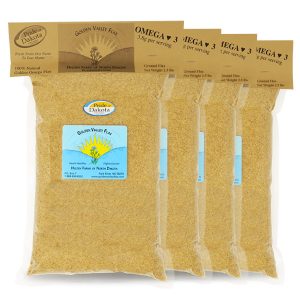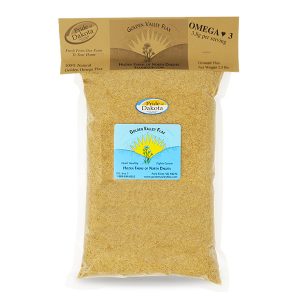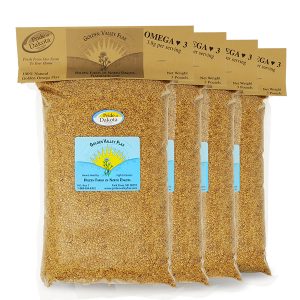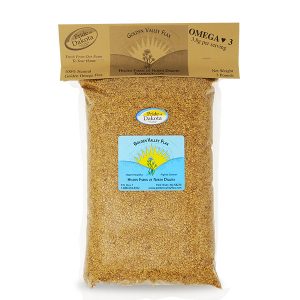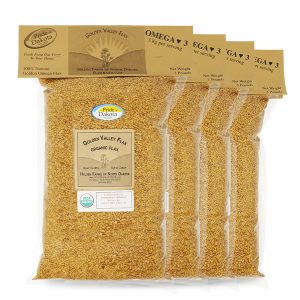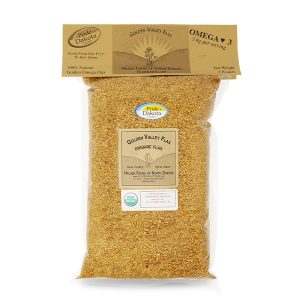
So, what’s all this about omega 3 fatty acids?
Blue Flax Field
Flax contains lots and lots of fat—but believe it or not, it’s the sort of fat that’s good for you! Most of the fat we get in our diet is the wrong kind—omega-6 fatty acids. This sort of fat is the “grease” you find in French fries, potato chips, or pepperoni pizza. It’s bad for your health, and just like you’ve always known, if you eat too much of it, you’ll get fat. Our ancestors, however, had a diet that was far more balanced between omega-6 fatty acids and omega-3’s. Omega-6’s were found in foods like corn, safflowers, sunflowers, canola and soybeans, and omega-3’s were found in flaxseed, salmon, herring, trout, sardines and albacore tuna. With a mix of these types of foods, our ancestors ate a diet that came close to a 1-to-1 ratio between omega-6 and omega-3 fatty acids.
Today, however, with the widespread consumption of fried food and the use of vegetable oils in cooking, we tend to eat a diet that’s wildly out of balance—about 25-to-1 in favor of omega-6’s, the “bad” fat! Many scientists believe that this imbalance is at the root of our society’s high levels of heart disease, hypertension, high blood pressure, and certain types of cancer.
It’s vitally important that we maintain the proper balance of omega-3 and omega-6 fatty acids in our diet. When we do, our body can do lots of things far better:
- Alert the immune system to go into action
- Tell the blood platelets to clot or not clot by sticking together or separating
- Regulate inflammation
- Form neural pathways for brain activity in learning, memory, and mood regulation
- Signal the blood vessels to either widen or to narrow
When our bodies don’t get enough omega-3’s, studies have noted an increase in diabetes, cancer, arthritis, inflammatory diseases, depression, heart disease, hypertension, memory problems, weight gain and some allergies and skin conditions. Getting the proper amount of omega-3’s is essential for healthy living, and one of the best ways to do so is by adding 2 to 4 tablespoons of ground flax to your daily diet. Flax is higher in omega-3’s than nearly all other foods, and can be simply and easily worked into a normal, healthy diet.
What are lignans, and what are they good for?
Lignans are a type of natural plant chemical, located within the cell of the flaxseed. When you eat flax, your body works on the lignans to convert them into potent, hormone-like substances known as phytoestrogenic compounds.
Research has indicated that people who eat a diet high in lignans have a low incidence of breast, colon and prostrate cancers. Scientists have concluded that the chemical release of phytoestrogenic compounds, created by lignans, is able to block the action of hormone-sensitive cancers.
Ground flax seed provides up to 800 times more lignans that any other plant! That’s why it’s doubly important to eat ground flaxseed, instead of just flaxseed oil—the oil doesn’t contain any lignans, and so won’t do a bit of good to prevent cancer. Eating 2 to 4 tablespoons of ground flaxseed daily will help your body prevent the formation of cancerous tumors.
Healthful Cooking
Fiber is necessary for the digestive system to work properly. Foods with a high amount of fiber include fruits, vegetables and whole grains. Flaxseed is a grain, and therefore high in fiber. What makes flax even better than the average grain, however, is its mix of both soluble and insoluble fiber.
Soluble Fiber: Most of the soluble fiber in flax is mucilage. Mucilage is a thick, sticky substance which serves as an effective cholesterol-lowering agent. It can be ground and baked into muffins or breads or added to your morning juice to provide you with the proper amount of fiber.
Insoluble Fiber: Studies show that insoluble fiber is very helpful for regulating bowel movements and preventing constipation. Flaxseed’s all-natural fiber components have the ability to hold water, helping to soften the stool and allowing it to move through the colon quickly.
Flaxseed is rich in both soluble and insoluble fiber, which together work to lower cholesterol, aid digestion, and prevent constipation, which has a protective effect against cancer.
Other Flax Articles You Might Like
- Nutritional Components of Flax
- (Flaxseed) Storage and Baking Stability
- Interactive Effects of Flaxseed and Tamoxifen on Human Breast Cancer
- Flaxseed, Lignans and Breast Cancer: An Update

